This article is more than 5 years old.
Inspired by the #myDHis Colloquium at this year’s Digital Humanities Summer Institute, I thought I’d write a post on my first academic year at Wake Forest as the Digital Humanities Research Designer. As the DSHI colloquium title suggests, Digital Humanities has a range of definitions, and an institution’s approach to “doing DH” is contingent on institutional resources and the buy-in of faculty and staff members, students, and even community members.
Since I first arrived in September, I have been working to get an idea of what DH looks like at Wake Forest and how digital initiatives can best be implemented to serve the institution. I have been pleased that there is a lot of enthusiasm for DH, and even curiosity about DH among those who may not be interested in pursuing it for their own research or pedagogical practices. The challenge at Wake, as at university, is to find a way to balance resources to adequately respond to requests for DH support, to harness excitement and energy for new methods of scholarship, and to address practical concerns about adoption of new technologies.
Without further ado, here’s my thesis after a year of DH-ing at Wake Forest:
#WakeDHis Collaborative, Scalable, and Engaged.
What follows is a summary of projects and programming that I’ve been a part of this year, which have shown me what #WakeDHis, as well as potential directions and growth I see for DH initiatives at Wake Forest.
Faculty Projects
Floating City and Rulers of Venice
One of the first faculty members I had the pleasure of collaborating with this year was Monique O’Connell. Monique’s research and teaching focus on medieval and early modern Venice. She maintains the Rulers of Venice Database, which provides access to the election records of the medieval Venetian republic. Thanks to the ZSR Tech Team, this project now “lives” on ZSR servers. The next phase of the project is to develop a page in which users can transcribe the records—a crowdsourcing effort, if you will—and to think about ways to visualize these records spatially through interactive mapping.
Monique also teaches a First Year Seminar, “Floating City.” I was lucky to work with her in this class (taking over for Chelcie Rowell upon her departure) as the digital specialist who would assist students in creating maps of Venetian ceremonies and 3D models of medieval buildings. I was very impressed to see how students took to SketchUp, the software they used to create their 3D models, and I hope to use this software for future projects in the classroom and in faculty research.
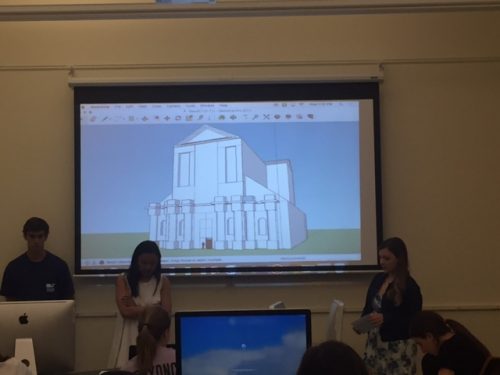
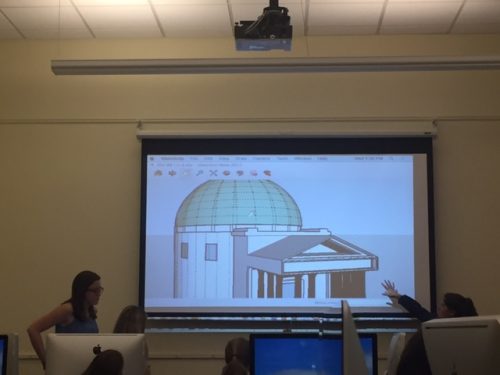
Tout le Monde
Stephanie Pellet came to the digital folks with an idea for an interactive French language instruction course, “Tout le Monde.” In the course, students read the popular novel, Tout le Monde, and watch the film. Throughout the semester they create a course blog and Rotten Tomatoes-style fan page where they log their responses to the story. During Stephanie’s graduate studies at the University of Texas, she worked closely with faculty who implemented “social reading” to improve students’ foreign language comprehension, and she wanted to bring this pedagogy to Wake Forest. The year was a success, and she saw great results from the interactive website we set up for her classes in the fall and spring semesters. The next phase involves creating an Open Educational Resource textbook, and I’m excited to have Kyle Denlinger on board in this endeavor. Stephanie and I are also presenting our work at the 2017 Foreign Language Association of North Carolina conference in Durham.
Other faculty collaborations have included Jessica Richard’s public humanities project, The 18th-Century Common, a WordPress site that offers a public space for sharing 18th-century scholarly research with nonacademic readers. I also enjoyed working with Phoebe Zerwick’s “Writing Justice” course, in which students generated content and for the WFU Law School’s Innocence and Justice Clinic website (now undergoing serious renovation based on the students’ recommendations!).
Programming
Humanities Institute
In addition to responding to requests from faculty for DH support, I worked with different groups to organize workshops, lectures, and discussion groups on DH. Central to this effort is the Humanities Institute, whose Engaged Humanities grant from the Mellon Foundation set forth a clear vision for DH at the university. As part of the Humanities Institute’s DH Creative Team, I work with faculty to plan programming that empowers faulty to incorporate digital tools and methods into their teaching and scholarship.
During the 2016-17 academic year, the DH Creative Team sponsored a lecture by Todd Presner, “Assessing Digital Humanities Scholarship: Challenges, Opportunities, and Perspectives.” Presner, the Chair of the Digital Humanities Program at UCLA, presented a flexible model for assessing digital scholarship for tenure and promotion. As an outgrowth of his presentation, the DH Creative Team offered a follow-up meeting in which department chairs met to discuss Presner’s recommendations and brainstorm ideas about ways to implement them in their evaluation metrics. In the spring, David Phillips and I continued the assessment conversation with a “How Did They Make That?”-style workshop for department chairs to discuss strategies for assessing digital projects.
The Humanities Institute also offers a “DH Kitchen” series, which offers informal talks and workshops on digital tools and methods being used around campus. In March I presented “One Map, Four Ways,” and walked through the affordances and limitations of visualizing spatial data using Esri Story Maps, Knight Lab Story Maps, Neatline, and Prezi. For the presentation I generated a digital version of a 1950s tourism map, “The Great Southwest,” using each of these tools to demonstrate the ways that different software can both emphasize and obscure various elements of a map.
Monique O’Connell presented the work her students accomplished in the Floating City course during the April DH Kitchen event. It was great to see how the class has evolved thanks to collaboration with Chelcie Rowell to redesign the class during the summer of 2016, as well the work that Monique and I did with the students during the spring 2017 course.
Library Lecture
I was extremely pleased to be invited to give a library lecture, “The Angel in the Harvey House,” in February. I presented material from my research on women’s literary and commercial work in the early 20th century American Southwest. This project involves less of the tech-y side of digital scholarship and focuses more on theorizing and understanding the ways that technology affects communication, creative output, and physical labor. It was great to see so many ZSR folks in the audience, and I really enjoyed hearing everyone’s feedback during the Q&A session.
Researcher Profiles Workshop
In January Molly Keener and I held a Researcher Profiles Workshop where we presented different ways to craft an online scholarly presence and to circulate published work. Among the tools presented were WordPress, Humanities Commons, and Academia.edu. We had a great turnout and quite a few attendees scheduled follow-up meetings with me about setting up a WordPress site to build a digital CV.
External Presentations
2016 Digital Library Federation Forum, Milwaukee, WI
In November 2016 I presented at the DLF Liberal Arts Pre-Conference on the panel, “Digital Scholarship Infrastructure at Liberal Arts Colleges.” My talk, “Changing the Shape of Liberal Arts Scholarship: A Library-Centered Approach,” covered the aspects of librarian-focused support in the digital humanities, taking the work I did as a CLIR Fellow at Bucknell as an example. I co-presented with the director of Digital Scholarship at Bucknell, Matt Gardzina, about ways we supported grant-funded student/faculty research projects during the summer of 2016.
It was great presenting alongside panelists Jacob Heil, College of Wooster, and Ashley Sanders, Claremont Colleges. Jacob spoke about achievements and challenges as the Ohio Five Libraries built consortial digital scholarship. Ashley’s presentation outlined ways she has worked with Claremont Colleges librarians to build multi-layered digital scholarship support. I had a great time presenting alongside them and hearing their creative and innovative ideas for growing digital scholarship programs at liberal arts institutions.
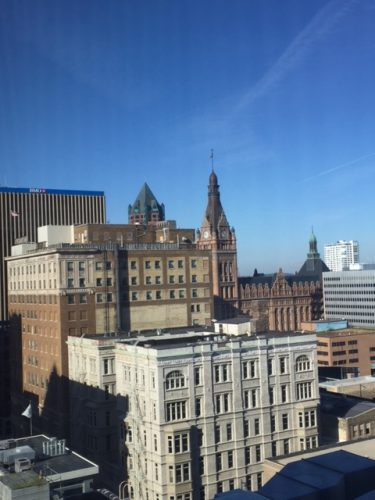
2016 American Studies Association Annual Meeting, Denver, CO
For the 2016 meeting of the American Studies Association, I organized a panel titled, “Home Screens: Digitizing Place and Belonging in American Studies.” I assembled a really cool group of digital humanists whose work focuses on archiving, narrating, and preserving American history and culture in digital format and/or on the web. The panel went well and we got some great questions from the audience. The presenters included Elizabeth Hopwood, Loyola University, Chicago, who presented her digital work on the histories of food culture in the 19th-century Americas; Sigrid Anderson Cordell, University of Michigan, who presented on her large-scale data analysis of the Los Angeles Times; Amy Lewis of St. Norbert College, who presented on her students’ digital mapping of Harriet Jacobs’ Incidents in the Life of a Slave Girl; and Jim McGrath, Brown University, who talked about his work building the public humanities “Our Marathon” Omeka exhibit about the Boston Marathon bombing.
2017 Modern Language Association Annual Convention, Philadelphia, PA
For the 2017 MLA Convention I organized a panel, “Keep the H in DH” and presented on the panel, “Recovery Work: Digital Approaches to the Archive.”
For the Keep the H in DH panel I assembled colleagues whose digital scholarship keeps humanistic inquiry at the heart of their methodology. Most of the panelists were former CLIR fellows like me: Spencer Keralis, University of North Texas; Alicia Peaker, Bryn Mawr College; and Lindsay Van Tine, University of Pennsylvania. Also presenting on the panel was Diane Jakacki, the Digital Scholarship Coordinator at Bucknell University. The panelists did an awesome job presenting examples from their projects that offered new ways to theorize digital work. The best outcome of the panel, I believe, was the ways each project suggested specific models for creating digital projects that go beyond merely representing data to perform robust cultural, social, and political critique.
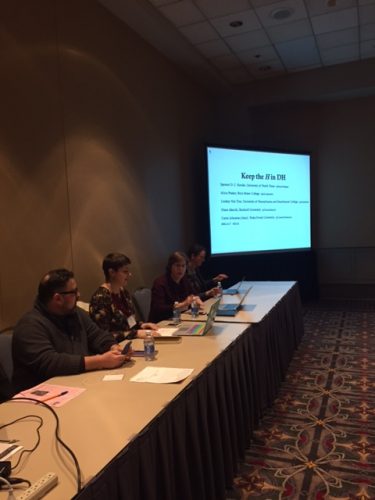
The Recovery Work panel was organized by the MLA Bibliography and Scholarly Editing Forum and panelists responded to the question, “What are the challenges and possibilities presented by DH and/in the archive?” Although it was an early morning panel, the room was packed and the Q&A was very productive. The question that we really mulled over was how to circumvent and negotiate paywalls and restrictive copyright laws when trying to recover and preserve archival materials. Elliott Shore of CLIR was in attendance and suggested that librarians work more closely with faculty to communicate which of the journals and vendors are working to support open access efforts, and which ones are working against such efforts. He cited the Elsevier boycott in Germany as an example of librarians and faculty working together to understand why it is important to support open access. He then had all of the librarians in the room raise their hands (about half of the crowd), and made the point that more meetings like this should be taking place so we can work together to achieve our shared goals of making scholarship more accessible.
Future Directions
The 2016-17 academic year, for me, was spent getting to know folks in ZSR, humanities departments, IS, and the TLC. I enjoyed learning about different teams’ goals and the types of teaching, learning, and scholarship they support and conduct. A lot of my work this year focused on responding to requests for digital scholarship support—which I will continue to do—but I am excited to craft a more intentional, focused direction for digital humanities at Wake in the 2017-18 academic year.
I will be running workshops under the #WakeDHis theme, from “What is DH?” to “Interactive Syllabus Design using Scalar” to “HathiTrust for Bookworms.” I would be super excited to collaborate with anyone in ZSR who might be interested in co-leading such workshops, or would like to learn more about these tools for future projects we might work together on.
Tanya Zanish-Belcher and I have also been cooking up some ideas, including developing a North Carolina Baptist Portal that will serve as a landing spot for all of the Baptist collections in the area, at Wake and elsewhere. The goal is to give people a big-picture perspective on where the collections live, in what format/condition they’re in, and how they can access these collections.
I’m also looking forward to hosting these events in the future digital scholarship space on Wilson 6. I hope to host lunchtime “unconferences” in our 6th floor space, and see these unconferences as an opportunity for ZSR folks to get together to informally chat about digital tools for teaching and research, and also just to chat!
If you’ve made it this far down the page, thank you for reading this very long post! I’m all ears if anyone has suggestions for future collaborations, and of course I’m around if anyone wants to talk more about DH at Wake.
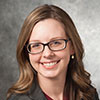
10 Comments on ‘#WakeDHis’
Carrie, you’ve had an incredibly productive first year with us here at ZSR & WFU. #WakeDHis lucky to have you!
A very interesting post. (I read the whole thing!) I also enjoyed the Harvey House lecture. Thanks to you, I felt very well informed when I encountered Harvey-related materials on my recent vacation to New Mexico.
This is awesome! (And I want to buy you a Starbucks and hear more about the Researcher Profiles Workshop!)
Thanks for sharing Carrie–lots of great work you are doing!
Thank you for sharing the work you’ve done already, Carrie, and your intentional work moving forward! I look forward to learning more about DH tools and continuing working on how archivists can capture and provide access to innovative scholarship.
Thanks for this very interesting summary of your wide-ranging activities and plans, Carrie! I’m looking forward to attending and learning from presentations you’ll be doing here at WFU/ZSR. And like Carol, I knew what a Harvey Girls reference on a Grand Canyon FB posting alluded to–google-free–thanks to your lecture!
It was helpful to get a comprehensive picture this way — thanks!
When do you sleep, Carrie? Or, perhaps: which of the 10 Carrie clones is responsible for writing this post? (You’re doing awesome, inspiring work. Looking forward to working with you/your clones more in the coming year.)
Great and highly informative post!
What a busy and productive Year 1 you’ve had! Congratulations and I can’t wait to see what’s in store for Year 2 in your new spaces.